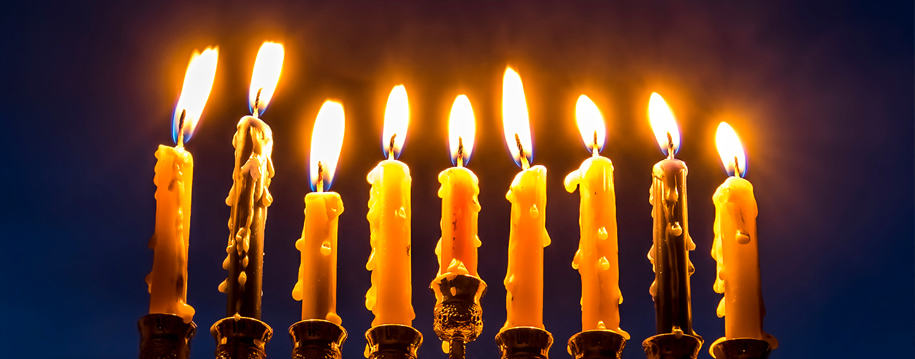
Chanukah and Tefillah: The Connection You Never Thought About
Before the Yamim Noraim, I received the following email from Links Magazine:
Hi! We are working on the Yamim Noraim magazine and want to do a Part II to Tefillah Questions Answered (we printed Part I two years ago).
Do any of you have a question that you’d like our rabbanim to answer, or has anyone shared with you a question that we can feature in our magazine?
Please reply to this message!
As soon I read this email, I was flooded with so much feeling. Tefillah is a hot topic for me. I struggle with it so much, but I yearn to be able to really daven properly. It is definitely something I have been working on for most of my life. And so I responded:
I have really struggled with tefillah. Would it be helpful for me to share a little bit about my growth in this area?
Miriam Rivky of Links answered:
Sure, please do.
Guess what? I never did.
The Next Email
After yom tov I received the Links email about writing a Pirkei Avos article for the Chanukah issue. I took out a Pirkei Avos and started skimming through. If this was going to be in the Chanukah issue, it should probably have something to do with Chanukah.
But the what caught my attention were the words in perk bais, passuk yud-ches:“אל תעש תפלתך קבע– when you daven, do not say the tefillos automatically, without thought.
Tefillah. It was still on my mind, and the words of this mishnah grabbed me.
Tefillah. The perfect topic for me.
But My Davening Needs So Much Improvement
Actually, wait. Why? I am not a good davener. I really struggle in this area. I want to be connected to Hashem. I wish I could open up that siddur and let my heart soar away with the words.
Usually as I say the words, my brain is on a roll: Oy, I forgot to call that person; I am running late – I need to get going. And of course, I always have interruptions. My baby starts climbing onto the stove; my daughter sees me davening but is standing next to me and saying, “Ma, Mommy, Maaaa…” I might as well just answer her.
Yet the topic is close to my heart. Maybe that’s because I have had so many challenging times in my life, and there was nowhere to turn except to Hashem. I knew it. I felt it. Yet I opened the siddur and couldn’t connect. No matter how fearful I was, I couldn’t concentrate.
One of my main tefillos is to beg Hashem to help me feel that connection and to help me hold on to whatever connection I have built.
I am Quick to Shut Down
When things are tough, I shut down. Quickly. It doesn’t take too long for me to lose that connection and to feel like my words are so empty. And then I wonder about myself. How can I not be davening with real kavanah? Look what I need from Hashem right now! When the pain and suffering come, I want the connection that I worked so hard on to remain. I want to be able to give myself completely over to Hashem.
This has been a journey for me. I have begun to recognize some of my patterns — what helps me daven better and even just how to talk to Hashem in a more connected way. I have learned not to be so hard on myself when kavanah eludes me, and I’ve learned some tools to help myself regain my connection with Hashem.
Limud HaTorah and Tefillah
When we talk about Chanukah, typically we talk about limud haTorah. The Yevanim wanted to take our Torah away from us. The biggest victory we can have over them is the amazing amount of Torah being learned around the world today. Chanukah is certainly a time for learning Torah and a time to show the Yevanim that Torah will always endure.
But I felt that there must be some place for tefillah in this yom tov as well. I looked again. The word jumped out at me: “קבע” – don’t make your tefillah habitual, so routine that it’s just the same words and maybe even the same emotions over and over again. Of course, this, too, is a Chanukah lesson.
During the time of war, when families were sending their husbands and sons to fight or were hiding from the Yevanim, their davening was very heartfelt. I think it’s safe to say that no mother or wife davened the same way then as she davened when her family was sleeping peacefully in their beds. And when Yidden defied the Greeks and made a bris or a chuppah, or when groups endangered their lives as they learned Torah, their tefillos had to have been more intense, more filled with emotion and probably expressed with lots of tears.
We Need Tefillah during These Challenging Times
We live during a time when life is challenging in so many ways. There are so many difficult nisyonos and so much uncertainty and pain. As Chanukah comes around, it is appropriate to remind ourselves that tefillah should never be stagnant. Whether you are in pain, experiencing fear or feeling confused, take out your siddur and daven. Daven not out of habit, but knowing that you can ask – אלא רחמים ותחנונים לפני המקום – offering a plea and a request before Hashem.
Of course, the nissim of Chanukah and of our victory were so incredible that we can’t help but burst into song, singing Hallel to Hashem. Tefillah isn’t only when we are in trouble. It is also for when we are content, happy or even exultant. Tefillah – don’t let it be “.קבע ” Use it to connect to Hashem in the hard times, as well as the good times.
This year, let one message of Chanukah be to work on infusing our tefillos with our true feelings – whatever they may be.
This article originally appeared in Links magazine and appears here in revised form, with permission.













